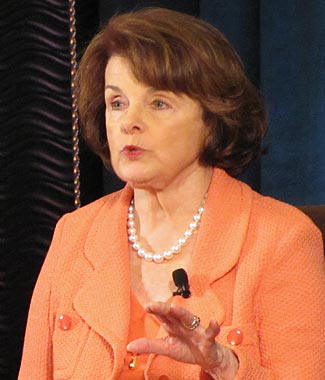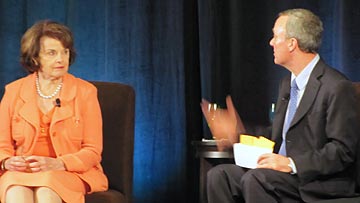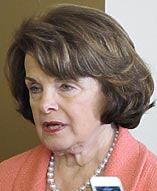April 3, 2013, San Francisco
Democratic Senator Dianne Feinstein, chair of the Senate Intelligence Committee, appeared at ClimateOne at the Commonwealth Club to discuss several topics, including attempts to ban assault weapons, the use of drones, and climate change. This video features her comments related to energy and climate change. During her appearance, Feinstein repeatedly stressed the importance of taking action to avert climate change and spoke critically of the Keystone XL pipeline, yet paradoxically acknowledged in a follow up press conference that governmental action on climate change was “not on the high priority list”. She said she intends to introduce a $10/ton carbon tax bill, with half of proceeds to be used to pay down the national debt.
Senator Feinstein: “The climate has already warmed at least one degree over a hundred years. And you know, people I think don’t really understand. They think the earth is immutable, they think we can’t destroy it, that it’s here to stay, and that it’s always been this way. It’s not so. You know, some two hundred million plus years ago, there’s geologic evidence to say that maybe there was only one land mass on earth and it all split apart. I don’t know whether that’s true or false, I’ve read a lot of science on the subject.”
 |
| “The question is, can we really bite the bullet and make the decision that we’re going to save the planet, because if it warms … 4 to 7 degrees, it’s too late.” ~ Senator Dianne Feinstein |
“But ever since the industrial revolution when we began to pump carbon dioxide through fuel into the atmosphere. The atmosphere is very limited, it’s maybe seven miles up, and that’s it. And it’s like a shell. And so every bit of this that’s pumped into the atmosphere stays, it doesn’t dissipate. So as we fill the atmosphere with pollutants, methane, carbon dioxide, other things, what happens is, it warms the earth. And it begins with, animal habitat disappears, it begins with the ocean beginning to rise, it begins with more violent hurricanes, tornadoes, funnel clouds in the pacific, where in my youth they never used to be, they are now, on occasion. And, lightning strikes, I remember one June where there were thousands of lightning strikes that started hundreds of small fires in California. When it rains the drops are bigger, the rains more violent. Drought is more prevalent. So I think, actually, what’s going to be the ultimate changer, is weather.”
“People see weather, they see hurricanes, they see the devastation, and so I think eventually, people are going to come around to support restrictions on carbon dioxide, maybe a fee on the use of carbon that goes in to replace our deficit, our debt. A twenty dollar fee I think is like 1.2 trillion in revenue over ten years. If you just take half that, it’s 600 billion. And it accomplishes something.”
Greg Dalton: “Is there much support for that in the Senate?”
Senator Feinstein: “I wouldn’t say there’s much, I would say this – people are coming to realize now. And we have a little caucus that meets and discusses, we’ve had I think three global warming bills up, they didn’t get, I mean they got thirty six or so votes, but, everything’s getting worse. The weather is getting worse, and the climate change is getting worse.  And actually since 2008, good energy has doubled, that’s the good thing. That you know electric cars are being more prevalent, hybrids are being more prevalent. People are saving money. So good things are happening, the question is, can we really bite the bullet and make the decision that we’re going to save the planet, because if it warms, and I heard your opening spot, 4 to 7 degrees, it’s too late. If we can confine this warming to one to two degrees, then, there’s big change, but it’s handle able. And that’s where we should strive to go. China in particular has a terrible, terrible problem. Deaths are now up from pollution. People are wearing masks virtually all winter long in Shanghai and Beijing.”
And actually since 2008, good energy has doubled, that’s the good thing. That you know electric cars are being more prevalent, hybrids are being more prevalent. People are saving money. So good things are happening, the question is, can we really bite the bullet and make the decision that we’re going to save the planet, because if it warms, and I heard your opening spot, 4 to 7 degrees, it’s too late. If we can confine this warming to one to two degrees, then, there’s big change, but it’s handle able. And that’s where we should strive to go. China in particular has a terrible, terrible problem. Deaths are now up from pollution. People are wearing masks virtually all winter long in Shanghai and Beijing.”
Greg Dalton: “And there’s been some recent reports putting price tags on all of that, the price of the health loss of life, etc. President Obama in his inaugural address and state of the Union pledged stronger action on climate. Do you think he’s doing enough? Specifically, what should he do?”
Senator Feinstein: “The President has so many things, and everybody says do you think he’s doing enough on this or that or the other thing, and he’s going to appoint a new EPA director. The EPA now has the ability to move ahead, so it’s very important that the EPA director be strong and be willing to take the action that’s necessary to help us all save this planet.”
Greg Dalton: “And you think Gina McCarthy will get confirmed?”
Senator Feinstein: “That’s a good question, everything is questioned these days. It’s the first time I have ever seen a president go through years of his presidency without being able to confirm members of his own cabinet.”
Greg Dalton: “And the judiciary?”
Senator Feinstein: “And the judiciary, well the judiciary is sort of a place apart. But for the executive branch to work, having your cabinet in place is a no brainer. You know, everybody says well elections matter, yes they matter. Whoever is president has to be able to govern and the way you govern is through your executives which are your cabinet secretaries.”

Greg Dalton: “Do you think the U.S. should approve the Keystone pipeline?”
Senator Feinstein: “I have just been reading a National Geographic article on tar sands, and everything I’ve seen in that article is bad. Now this tar sands project is up in Alberta. I’m told that the area is bigger than the state of Florida. I’m told that it’s a forested area which they mowed down and then began to dig the huge giant lakes, that they pour chemicals in to produce this form of tar sands oil. The earth is defaced forever. Now we have to make up our minds – do we want to deface large portions of our earth forever? I don’t think so, because we’re making progress on clean energy, and that ought to be where we go. And some people say well, you know, if that pipeline isn’t built north to south through the center of our country, they’re only going to do it east to west and send it to China. I think that is really not a very good argument because I think we really have to look at tar sands.”
Greg Dalton: “Another area of potential large oil development is here in California – the Monterey shale new fracking technologies making accessible about 15 billion barrels of oil which is equal to half the amount originally in the north slope of Alaska. Should that be developed and should California tax that? California is the only state that doesn’t tax oil extraction.”
Senator Feinstein: “Well I sure think we ought to tax it. Because I don’t think candidly that it’s all that necessary. There will be no drilling off the coast of California if Senator Boxer and I prevail, and we have so far. And the house delegation as well. The people of our state voted, and we voted against offshore oil drilling and I believe we ought to keep that vote. But my emphasis would be on clean energy, you know the wind farms, the solar facilities…and there’s so much research going on, on different forms of fuels. I’m amazed at what they think they can make fuel out of these days. So you know, I say, that’s just great, let’s do it. And leave these fossil fuels alone because they pollute the atmosphere.”
Water
“I spend a lot of my time on water in California. There is no question in my view that we are on our way to a much drier climate, we are on it because of global warming. We are on our way to the major source of water, which is the Sierra Nevada snow pack, drying up. And it’s very serious, and so there are big water fights. Right now the water allocation for south of Delta farmers I believe is 20% of their contract amount, that is way too little. A farmer can’t plant, irrigate and harvest with twenty percent of his contract amount. He probably can’t go to the banks and get the loans that he might need with twenty percent of his contract.”
National Security
 “If you have low lying areas, let’s take Bangladesh, let’s take some of the bigger islands, and they are flooded, where do people go, and what’s the result of that movement of people in low lying areas all over the world? What’s the result in oceans warming so that fishing stocks are killed or no longer as prevalent. So these are the kinds of national security concerns I think that emanate from that. And what was being done is having our satellites track various areas so that we could note changes over years- the melting arctic, the melting Antarctic. Greenland which is substantial melting, and from that you see the movement of people that’s gonna have to take place and then what happens with that. ”
“If you have low lying areas, let’s take Bangladesh, let’s take some of the bigger islands, and they are flooded, where do people go, and what’s the result of that movement of people in low lying areas all over the world? What’s the result in oceans warming so that fishing stocks are killed or no longer as prevalent. So these are the kinds of national security concerns I think that emanate from that. And what was being done is having our satellites track various areas so that we could note changes over years- the melting arctic, the melting Antarctic. Greenland which is substantial melting, and from that you see the movement of people that’s gonna have to take place and then what happens with that. ”
Greg Dalton: “And some people are very concerned about Indonesia, largest Muslim country, heavily dependent on fishing. If fishing starts to go down in Indonesia, what does that mean for stability…”
Senator Feinstein: “That’s what I tried to say, I wasn’t as eloquent as you were.”
Greg Dalton: “Last question is, how do you think climate change will affect you and your family in years ahead?”
Senator Feinstein: “Well, I have seven grandchildren, and I really believe it will affect them. And I really hate to say this, but I spent forty years in this life in government, and to end it and not have secured a world that’s capable of sustenance and beauty and wonder for my grandchildren, is just a crushing blow. So, I hope that within the next six years, you’re going to see a climate change bill pass in the Senate and the House and be signed by this President.”
Q (press conference): “What action can we expect on climate change?”
Senator Feinstein: “I think that’s hard to predict right now. I think it’s not on the high priority list. I think that a carbon fee is growing in popularity. It’s my intention – I know there’s been a bill introduced at twenty dollars a ton, and it’s my intention to introduce one at ten dollars a ton, and we’ll see what happens to it.”
Report by James George



























































